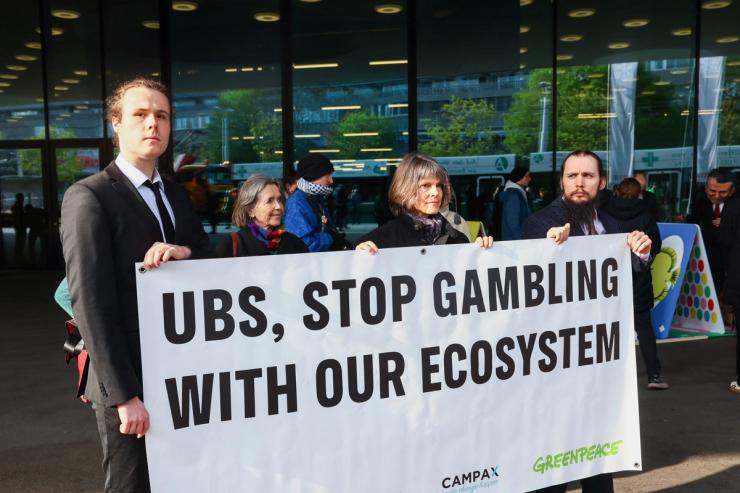The News
Wells Fargo shareholders rejected a proposal this week for the bank to report on whether its corporate lobbying conflicts with its net zero targets, following the rejection last week of other climate-related measures by shareholders of Bank of America and Goldman Sachs.
But more notable than the loss at Wells Fargo were two votes at Citigroup that didn’t happen at all, and which could signal a new era of rapprochement on climate between banks and a broadening range of their investors.
In this article:
Tim’s view
The anti-ESG backlash among Republican lawmakers in the US has created a perilous environment for the biggest asset managers, with State Street and several others backing out of a $68 trillion climate investment group for fear of being tarred as activists. For climate-minded investors, this week was a typical rough start to the corporate annual general meeting season that will stretch over the next month or so, which has become a forum for recurring battles between executives, asset managers, and activist investors over companies’ climate policies — usually with more losses than wins on climate-related votes.
But in some corners of Wall Street, the activist investors who used to shout about climate from the sidelines are getting more sophisticated about finding common ground with companies and other shareholders. Over the next few weeks, shareholders will vote on a record 263 climate-related resolutions at North American companies, setting a test of how strong that coalition really is.
Citi shareholders were supposed to face two climate resolutions at their meeting this week. One, proposed by an activist investor group, asked the bank to report on the climate transition strategies of its clients. The other, proposed by New York City pension fund manager Brad Lander, asked it to disclose its ratio of clean energy vs. fossil fuel financing. Both measures were withdrawn ahead of the meeting, after the bank agreed to the demands. JP Morgan and the Royal Bank of Canada also cut similar pre-vote deals with Lander. “The agreements we reached highlight how feasible our proposals truly are,” he told me.
Lander wasn’t able to persuade executives at Bank of America or Goldman Sachs to reach a deal on ratio disclosure, and shareholders of both voted down his proposal last week. But each measure got nearly one-third of voters’ support, which indicates that while giants like BlackRock may be stepping back, more mid-sized asset managers are being brought into the fold, said Kirsten Spalding, vice president of the Ceres Investor Network at the sustainable investing advocacy group Ceres.
Across the board this year, Spalding said, climate investors are dropping some of their more interventionist demands — like forcing companies to adopt deeper emissions cuts or sever ties with fossil fuels — and focusing more on issues like disclosure and lobbying policy that they know will appeal to more asset managers. As a result, she said, “I do think we’ll see higher votes.” Meanwhile, deals like Lander’s with Citi may become more common as climate becomes a routine topic in companies’ meetings with investors, rather than something they only hear about once a year from activists, Spalding said.
“We are seeing banks become more responsive on certain issues,” Lander said. “But unfortunately not all.”
As long as fossil fuels remain profitable, large banks can’t simply turn that business down, which makes it impossible for them to agree to the kind of strict carbon accounting some activist investors want to see. Yet Citi’s own internal research indicates that fossil fuel lending is a liability, Reuters reported this week, because its loan book could take a $10.3 billion hit in the next decade if stricter climate policy starts to cut more into its fossil fuel clients’ bottom lines.
It’s because of that risk that big asset managers need to move beyond disclosure and lobbying to support shareholder resolutions that more directly dictate company policy, Ben Cushing, campaign director of the Sierra Club’s fossil-free finance campaign, said. But unless Larry Fink at BlackRock and other behemoths like him are convinced of that point, there will be a hard limit on how big a coalition climate investors can expect to build.
Room for Disagreement
If climate shareholders’ relations with banks are getting fuzzier, with Big Oil they’ve never been so toxic. In February, ExxonMobil sued two shareholder groups it claims are abusing the proxy voting system by repeatedly filing the same proposal, and a campaign is growing among climate activist investors to oust CEO Darren Woods at the company’s meeting on May 29. Lander is also leading a campaign to oust Saudi Aramco CEO Amin Nasser from the board of BlackRock, and Shell is fending off a resolution that it adopt stronger emission targets.
The View From London
Climate shareholders confronted HSBC executives at the bank’s meeting today in London. Although a specific resolution wasn’t on the table, Jeanne Martin, head of the banking programme at advocacy group ShareAction, said they are pushing the bank to be more transparent about how exactly it intends to allocate a planned $1 billion in sustainable finance by 2030. “Sometimes ‘transition’ financing [for high-emitting companies] gets put in the same package as truly green finance, which is really problematic,” she said.


